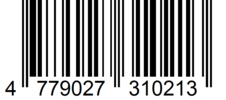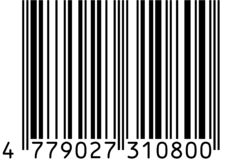BTSID1 EAN: Difference between revisions
No edit summary |
|||
| (3 intermediate revisions by the same user not shown) | |||
| Line 6: | Line 6: | ||
=='''BTSID1 EAN - 4779027310213'''== | |||
'''BTSID1 EAN - 4779027310213''' | |||
[[File:BTSID1_EAN.png|alt=|226x226px]] | [[File:BTSID1_EAN.png|alt=|226x226px]] | ||
=='''BTSID1 ATEX EAN - 4779027310800'''== | |||
'''BTSID1 EAN | |||
[[File:BTSID1_EAN_ATEX.png|alt=|226x226px]] | [[File:BTSID1_EAN_ATEX.png|alt=|226x226px]] | ||
Latest revision as of 06:44, 28 August 2024
Main Page > Sensors > EYE BEACON / BTSID1 > BTSID1 Nomenclature, classification codes > BTSID1 EANAbout EAN
The International Article Number (also known as European Article Number or EAN) is a standard describing a barcode symbology and numbering system used in global trade to identify a specific retail product type, in a specific packaging configuration, from a specific manufacturer. The standard has been subsumed in the Global Trade Item Number standard from the GS1 organization; the same numbers can be referred to as GTINs and can be encoded in other barcode symbologies defined by GS1. EAN barcodes are used worldwide for lookup at retail point of sale, but can also be used as numbers for other purposes such as wholesale ordering or accounting.
Which information is included in an EAN? The EAN includes the country of origin, the manufacturer and a product number. In addition to that it includes a checksum.
What is the difference between UPC and EAN?
A UPC is a 12-digit barcode used in North America to identify most products. The rest of the world uses 13-digit EAN barcodes to identify products. However, both types of barcodes are part of GS1’s international standards and both are accepted globally.


